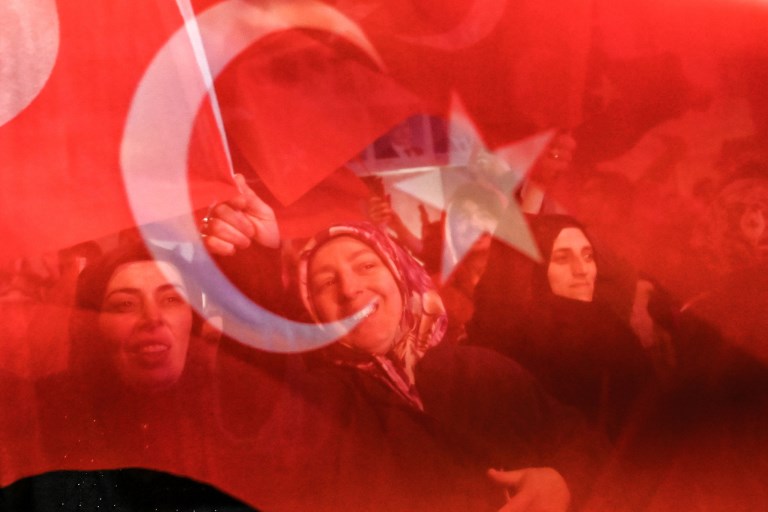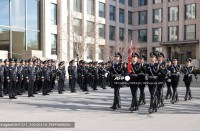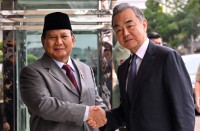
by Fulya Ozerkan with Raziye Akkoc in Ankara
ISTANBUL, Turkey (AFP) — Turkish President Recep Tayyip Erdogan’s ruling AKP appeared headed for defeat in the capital Ankara in Sunday’s local elections, delivering a blow to the party in power for a decade and a half.
With 92 percent of the ballot boxes counted, the joint opposition candidate for Ankara mayor was ahead with 50.62 percent of votes and the AKP on 47.20 percent, Anadolu state agency reported citing preliminary results.
In Istanbul, Turkey’s largest city and economic hub, the race for mayor was a dead heat with the AKP candidate claiming victory with 48.88 percent of votes, but his opponent on 48.50 percent was refusing to concede, after almost all ballot boxes were counted.
Erdogan and his Justice and Development Party (AKP) have won every vote since the party first came to power in 2002, but this time, analysts said the party had risked losing Ankara and faced a tough fight in Istanbul as an economic slowdown took hold in Turkey.
“Every gain and every loss is the will of our people and also a requirement of democracy that should be acknowledged,” Erdogan said in Istanbul before heading to Ankara to make a post-election speech.
“We will admit we won the hearts of our people in areas that we won and we will admit we were not successful enough in areas we lost.”
Sunday’s poll was the first municipal ballot since Turks approved constitutional reforms in 2017 to create an executive presidency that gave Erdogan wider powers after 16 years in office.
But Erdogan, whose ability to win continuously at the polls is unparalleled in Turkish history, was more vulnerable with the economy in recession, unemployment higher and inflation in double digits.
Much of the AKP’s success has been down to Erdogan’s perceived economic prowess, but days before the vote, the Turkish lira was sliding again, provoking memories of the 2018 currency crisis that badly hurt Turkish households.
Voters on Sunday elected scores of mayors, municipal councils and other local officials.
In Ankara, Mansur Yavas — the candidate for both the opposition Republican People’s Party or CHP and the nationalist Good Party — had been slightly ahead in some recent opinion polls before the election.
In Istanbul, a city where Erdogan had described victory as like winning Turkey itself, he fielded one of his loyalists, former prime minister Binali Yildirim.
“We have won the election in Istanbul. We thank Istanbul’s residents for the mandate they have given us,” Yildirim told supporters.
But his opponent Ekrem Imamoglu dismissed Yildirim’s claim as an attempt to manipulate opinion and asked him to be responsible while the final tally was being completed.
During voting, two members of Saadet (Felicity), a religiously conservative party, died after a fight between two groups in Puturge in eastern Turkey, private DHA news agency reported. The Malatya governorate said four individuals were detained.
Rallying the party
Erdogan, who began his own political career as Istanbul mayor, personally campaigned hard across Turkey, often with several rallies a day, even though he was not on the ballot.
Looking to galvanise his base among conservative Turks, the president cast the election as a matter of survival, attacking opposition candidates by branding them as linked to PKK Kurdish militants.
For his supporters, Erdogan remains the strong leader they believe Turkey needs and they tout the country’s economic development over the years he and the AKP have been in power.
But rights activists and even Turkey’s Western allies say that under Erdogan’s leadership, democracy has been eroded, particularly after a failed 2016 coup that led to tens of thousands of people being arrested.
“The economy isn’t doing so good for sure, but I have confidence in our president and things will be better after the election,” said Koksal Karacan, a retiree who voted in Istanbul’s Kasimpasa, where Erdogan grew up.
The vote was the first time since 2002 that the AKP fielded candidates with its alliance partner, the rightwing Nationalist Movement Party (MHP).
The opposition pro-Kurdish Peoples’ Democratic Party (HDP) has refused to field candidates in several cities, saying the elections are unfair. Some of its leaders have been jailed on terror charges, accusations they reject.
Observers say that with most media pro-government, opposition parties campaigned at a disadvantage because Erdogan’s daily rallies dominated TV coverage.
With inflation at just under 20 percent and unemployment at a near 10-year high in December, Erdogan had sought to reassure voters about the economy. He blamed the lira currency fall on a campaign to undermine Turkey, led by the United States.
Turkey’s finance minister Berat Albayrak, who is Erdogan’s son-in-law, has said economic reforms would be announced the week of April 8.
© Agence France-Presse







